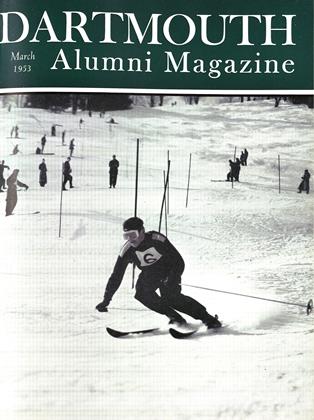As the new semester got under way last month, the first classes were held in a new course numbered Science 12 and designed to show the "how" rather than the "what" of science. Since the course has been elected by some forty students, a greater number than had been anticipated, it has been divided into two sections, with three lectures and a two-hour discussion and demonstration period scheduled weekly.
"Science 12," an inter-divisional course, has been planned primarily for non-scientists, with the aim of providing them with an insight into the processes of scientific research and discovery, and the theories and applications which derive from them. In order to present this material, the committee which planned the new course has purposely confined the subject matter to four "case histories" or selected episodes vital to scientific development during the past three centuries. These are (1) development of the understanding of gases, (2) concepts of heat and temperature as they came to be understood in the 18th Century, (3) the chemical revolution, and (4) Louis Pasteur and the theory of fermentation. Ordinarily these milestones in science would receive only limited mention in chemistry, physics or biology courses. The historically important phlogiston theory, usually briefly treated, preceded the modern concept of chemistry and how elements combine. In Science 12 this theory receives three weeks of study.
"We try to put the students in the same position as the scientist," Prof. John H. Wolfenden, chairman of the planning committee, said. "Nothing like a survey course, which is something like a trip in a sight seeing bus covering a lot of territory rapidly, is contemplated. Science 12 will be more like a D.O.C. hike, which does not impart to the hiker a knowledge of global geography, but which does give him some idea of what hiking is like."
Since modern advances in technology affect us all, such a course is considered to be of value in a general education. Science 12 is open to sophomores, juniors and seniors. The College's one-year requirement of biology, chemistry, geology, mathematics or physics has acquainted them with some of the results of scientific discovery. What most students have not learned is how greatly research, correlation of results, and practical application depend upon ordinary luck, hit-or-miss effort and seemingly waste motion. In Professor Wolfenden's words, "Too many believe that scientific research involves thinking about a problem, setting up a program, and then getting the answer." The student who makes a detailed study of ways in which great discoveries have happened gains insight into some of the time-consuming problems, chances, and techniques of scientific investigation.
Much of the planning for Science 12 was based upon a course inaugurated by President Emeritus Conant at Harvard. At Dartmouth the suggestion came as the result of a study of the scientific part of the curriculum, made under the direction of Prof. Bancroft H. Brown during 1948-50. Under the general supervision of the Executive Committee of the Division of the Sciences, Science 12 is conducted for its first semester by the committee made up of John H. Wolfenden, Professor of Chemistry, chairman; William W. Ballard '28, Professor of Zoology; Douglas M. Bowen, Assistant Professor of Chemistry; Russell B. Bryan, Instructor in Physics; and Lawrence N. Hadley Jr., Assistant Professor of Physics.
 View Full Issue
View Full Issue
More From This Issue
-
 Class Notes
Class Notes1929
March 1953 By F. WILLIAM ANDRES, EDWIN C. CHINLUND -
 Class Notes
Class Notes1918
March 1953 By ERNEST H. EARLEY, DONALD L. BARR -
 Article
ArticleEducation for What?
March 1953 By CHARLES LEONARD STONE '17 -
 Article
ArticleThe Responsibility of Management
March 1953 By CLARENCE B. RANDALL -
 Article
ArticleHome Thoughts On Europe
March 1953 By FRANCIS R. DRURY JR. 48 -
 Class Notes
Class Notes1920
March 1953 By RICHARD M. PEARSON, ROSCOE O. ELLIOTT
Article
-
 Article
ArticleINTERCOLLEGIATE DISARMAMENT CONFERENCE
December 1921 -
 Article
ArticleFamily Politics
April 1995 -
 Article
ArticleSome Thoughts on the Election
February 1961 By ALAN FIELLIN -
 Article
ArticleThe Undergraduate Chair
June 1947 By CHARLES CLUCAS '44 -
 Article
ArticleTuck School
June 1947 By G. W. Woodworth, H. L. Duncombe Jr. -
 Article
ArticleTwo Emergencies
June 1935 By The Editors

